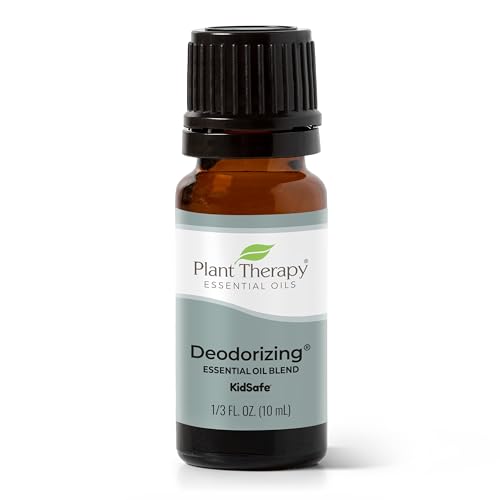
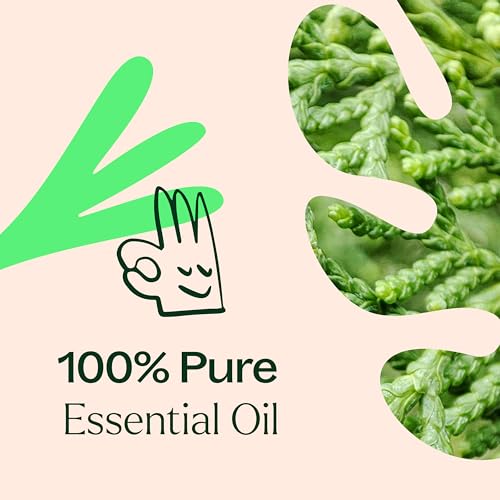
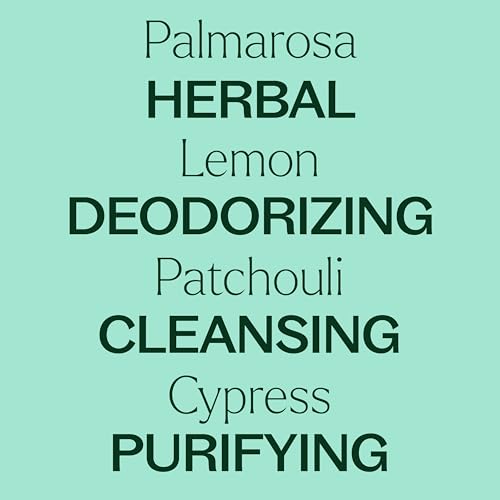
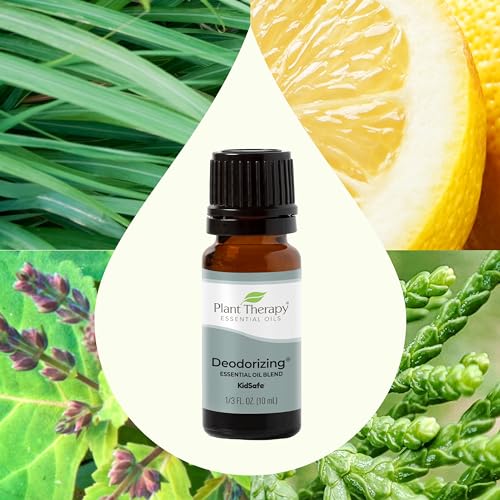

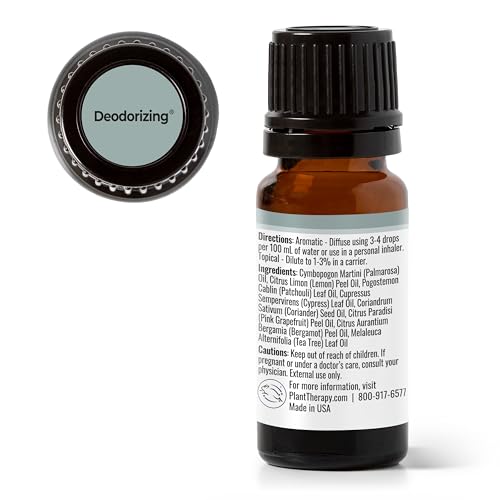
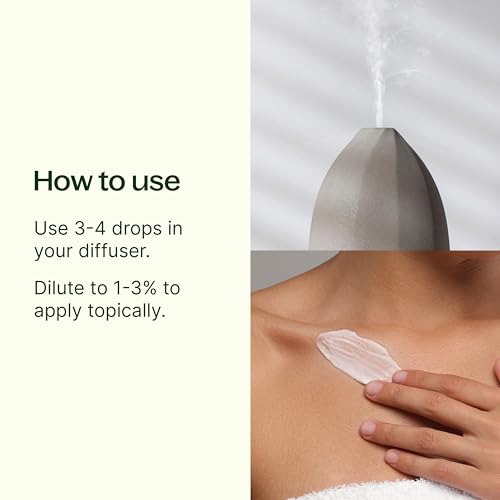
Plant Therapy Deodorizing Essential Oil Blend - Naturally Odor-Fighting, 100% Pure - 10 mL


Citrus Aurantium Bergamia (Bergamot) Fruit Extract
High RiskCitrus aurantium bergamia (bergamot) fruit extract is derived from the bergamot orange, primarily used for its aromatic properties and as a flavoring agent. It is commonly found in personal care products and fragrances, where it serves to enhance scent profiles.
Sustai Insights
Bergamot extract offers functional benefits such as providing fragrance and potential skin conditioning. However, it carries significant health risks, including a high potential for allergic reactions and skin irritation. Environmental concerns include its classification under certain regulations that restrict its use due to irritation potential. The ingredient is considered to have a high overall risk level, necessitating caution in its application, particularly for sensitive populations. Alternatives such as synthetic fragrances or other essential oils may provide safer options.
Cymbopogon Martini (Palmarosa)
High RiskCymbopogon martini, commonly known as palmarosa, is a grass native to India and is primarily used for its essential oil, which serves as a fragrance and potential antibacterial agent in cosmetic formulations.
Sustai Insights
Palmarosa oil offers functional benefits including its use as a natural fragrance and potential antimicrobial properties. However, it has a high allergenic potential, posing risks of skin irritation and sensitization. Environmentally, it may not be significantly hazardous, but concerns about its cultivation practices exist. Regulatory bodies place some restrictions on its use, leading to an overall high risk assessment. Safe usage practices should be followed, and consideration for alternatives such as lavender or geranium oils may provide safer options.
Citrus Paradisi (Grapefruit) Oil
Medium RiskCitrus paradisi (grapefruit) oil is an essential oil derived from the peel of grapefruit. It is commonly used in personal care products for its fragrance and potential antibacterial properties. It is also utilized in aromatherapy and cosmetic formulations for its refreshing scent.
Sustai Insights
Citrus paradisi oil offers functional benefits such as fragrance enhancement and potential antimicrobial properties. However, it presents a high allergenic potential, which may cause skin irritation or allergic reactions in sensitive individuals. Environmental concerns include its persistence and bioaccumulation. Regulatory advisories exist that restrict its use in certain products, leading to an overall moderate risk assessment. Safe usage practices should be followed to minimize health risks, and alternatives such as essential oils with lower allergenic profiles could be considered.
Citrus Limon (Lemon)
Low RiskCitrus limon, commonly known as lemon, is a citrus fruit used primarily for its juice and zest. It is often included in personal care products for its astringent properties and as a natural fragrance. It is recognized for its potential antioxidant benefits and as a source of vitamin C.
Sustai Insights
Citrus limon offers functional benefits like acting as a natural preservative and providing fragrance in formulations. It is sustainably sourced and biodegradable. Health risks are considered low for carcinogenicity, allergies, and reproductive toxicity. Environmental risks are minimal, with no significant bioaccumulation. Regulatory status is favorable, with no current restrictions noted. Overall, this ingredient poses a low risk, making it a safe choice for consumers.
Pogostemon Cablin (Patchouli)
Low RiskPogostemon cablin, commonly known as patchouli, is an aromatic plant widely used in perfumery, cosmetics, and traditional medicine. Its essential oil is extracted from the leaves and is valued for its distinctive scent and potential benefits in fragrance formulations and skin care products.
Sustai Insights
Patchouli oil offers functional benefits as a fragrance and potential antimicrobial agent. It is derived from a renewable source, contributing to sustainability. Health risks are minimal, with low concerns regarding carcinogenicity, allergies, and reproductive toxicity. Environmental risks are also low, with no significant pollutant or bioaccumulation concerns. Regulatory status is favorable, as it is not heavily restricted. Overall, the risk level associated with patchouli oil is low, making it a suitable ingredient in various applications.
Cypress
Low RiskCypress is a plant-derived ingredient commonly used in personal care products. It is derived from the wood, leaves, and essential oils of various cypress species. The ingredient is known for its aromatic properties and is often utilized for its potential astringent and antimicrobial effects in formulations.
Sustai Insights
Cypress offers functional benefits such as antimicrobial properties and is often sustainably sourced. Health risks are minimal, with low concerns regarding carcinogenicity, allergies, or reproductive toxicity. Environmental risks are also low, with no significant pollutant or bioaccumulation concerns. Regulatory status indicates no restrictions, suggesting overall low risk. Safe usage practices include avoiding high concentrations in sensitive areas, and alternatives may include other plant extracts with similar properties.
Melaleuca Alternifolia (Tea Tree)
Low RiskMelaleuca alternifolia, commonly known as tea tree, is an unspecified preparation derived from the leaves of the tea tree. It is primarily used for its antiseptic properties and is found in various personal care products.
Sustai Insights
Tea tree oil offers functional benefits such as antimicrobial properties, making it effective in skincare formulations. It is considered to have low health risks, including low concerns for carcinogenicity, allergies, and reproductive toxicity. Environmental risks are minimal, with no significant pollutant or bioaccumulation potential. Regulatory bodies have noted no major advisories, and overall risk assessment remains low. For safe usage, it is recommended to use appropriate concentrations and consider alternatives like lavender or eucalyptus oil for similar benefits.
Citrus Aurantium Bergamia (Bergamot) Fruit Extract
High RiskCitrus aurantium bergamia (bergamot) fruit extract is derived from the bergamot orange, primarily used for its aromatic properties and as a flavoring agent. It is commonly found in personal care products and fragrances, where it serves to enhance scent profiles.
Sustai Insights
Bergamot extract offers functional benefits such as providing fragrance and potential skin conditioning. However, it carries significant health risks, including a high potential for allergic reactions and skin irritation. Environmental concerns include its classification under certain regulations that restrict its use due to irritation potential. The ingredient is considered to have a high overall risk level, necessitating caution in its application, particularly for sensitive populations. Alternatives such as synthetic fragrances or other essential oils may provide safer options.
Citrus Limon (Lemon)
Low RiskCitrus limon, commonly known as lemon, is a citrus fruit used primarily for its juice and zest. It is often included in personal care products for its astringent properties and as a natural fragrance. It is recognized for its potential antioxidant benefits and as a source of vitamin C.
Sustai Insights
Citrus limon offers functional benefits like acting as a natural preservative and providing fragrance in formulations. It is sustainably sourced and biodegradable. Health risks are considered low for carcinogenicity, allergies, and reproductive toxicity. Environmental risks are minimal, with no significant bioaccumulation. Regulatory status is favorable, with no current restrictions noted. Overall, this ingredient poses a low risk, making it a safe choice for consumers.
Cymbopogon Martini (Palmarosa)
High RiskCymbopogon martini, commonly known as palmarosa, is a grass native to India and is primarily used for its essential oil, which serves as a fragrance and potential antibacterial agent in cosmetic formulations.
Sustai Insights
Palmarosa oil offers functional benefits including its use as a natural fragrance and potential antimicrobial properties. However, it has a high allergenic potential, posing risks of skin irritation and sensitization. Environmentally, it may not be significantly hazardous, but concerns about its cultivation practices exist. Regulatory bodies place some restrictions on its use, leading to an overall high risk assessment. Safe usage practices should be followed, and consideration for alternatives such as lavender or geranium oils may provide safer options.
Pogostemon Cablin (Patchouli)
Low RiskPogostemon cablin, commonly known as patchouli, is an aromatic plant widely used in perfumery, cosmetics, and traditional medicine. Its essential oil is extracted from the leaves and is valued for its distinctive scent and potential benefits in fragrance formulations and skin care products.
Sustai Insights
Patchouli oil offers functional benefits as a fragrance and potential antimicrobial agent. It is derived from a renewable source, contributing to sustainability. Health risks are minimal, with low concerns regarding carcinogenicity, allergies, and reproductive toxicity. Environmental risks are also low, with no significant pollutant or bioaccumulation concerns. Regulatory status is favorable, as it is not heavily restricted. Overall, the risk level associated with patchouli oil is low, making it a suitable ingredient in various applications.
Cypress
Low RiskCypress is a plant-derived ingredient commonly used in personal care products. It is derived from the wood, leaves, and essential oils of various cypress species. The ingredient is known for its aromatic properties and is often utilized for its potential astringent and antimicrobial effects in formulations.
Sustai Insights
Cypress offers functional benefits such as antimicrobial properties and is often sustainably sourced. Health risks are minimal, with low concerns regarding carcinogenicity, allergies, or reproductive toxicity. Environmental risks are also low, with no significant pollutant or bioaccumulation concerns. Regulatory status indicates no restrictions, suggesting overall low risk. Safe usage practices include avoiding high concentrations in sensitive areas, and alternatives may include other plant extracts with similar properties.
Melaleuca Alternifolia (Tea Tree)
Low RiskMelaleuca alternifolia, commonly known as tea tree, is an unspecified preparation derived from the leaves of the tea tree. It is primarily used for its antiseptic properties and is found in various personal care products.
Sustai Insights
Tea tree oil offers functional benefits such as antimicrobial properties, making it effective in skincare formulations. It is considered to have low health risks, including low concerns for carcinogenicity, allergies, and reproductive toxicity. Environmental risks are minimal, with no significant pollutant or bioaccumulation potential. Regulatory bodies have noted no major advisories, and overall risk assessment remains low. For safe usage, it is recommended to use appropriate concentrations and consider alternatives like lavender or eucalyptus oil for similar benefits.
Citrus Paradisi (Grapefruit) Oil
Medium RiskCitrus paradisi (grapefruit) oil is an essential oil derived from the peel of grapefruit. It is commonly used in personal care products for its fragrance and potential antibacterial properties. It is also utilized in aromatherapy and cosmetic formulations for its refreshing scent.
Sustai Insights
Citrus paradisi oil offers functional benefits such as fragrance enhancement and potential antimicrobial properties. However, it presents a high allergenic potential, which may cause skin irritation or allergic reactions in sensitive individuals. Environmental concerns include its persistence and bioaccumulation. Regulatory advisories exist that restrict its use in certain products, leading to an overall moderate risk assessment. Safe usage practices should be followed to minimize health risks, and alternatives such as essential oils with lower allergenic profiles could be considered.
Discover the Plant Therapy Deodorizing Essential Oil Blend, a powerful, naturally odor-fighting solution crafted by expert aromatherapists. This therapeutic-grade blend combines Palmarosa, Lemon, Patchouli, and more to keep your space fresh and clean without harsh chemicals.
- Natural Odor Control: Effectively neutralizes unwanted odors, making it ideal for homes, gym bags, and shoes.
- Versatile Applications: Use it in diffusers, as a homemade deodorant, or a refreshing room spray to suit your needs.
- Affordable Quality: High-quality essential oils at a price that allows you to enhance your wellness journey without breaking the bank.
- Health-Conscious Ingredients: Free from synthetic additives, this blend is crafted from pure, therapeutic-grade oils, promoting a healthier environment.
- Easy to Use: Mixes easily with common household ingredients, empowering you to create your own natural deodorizing solutions.
Elevate your wellness routine with this eco-friendly essential oil blend, designed to bring freshness and positivity into your life.
Subscribe & Save with Sustai
- Best Price Guarantee: Always enjoy the lowest prices on sustainable home essentials.
- No Surprises: We’ll notify you before shipping. No hidden fees, ever.
- You’re in Charge: Change, pause, or cancel your subscription anytime with ease.
- Eco-Friendly Deliveries: Our grouped shipments mean less packaging and lower emissions.
Join us on a sustainable journey. Special offers for a limited time! Prices and promotions may change.
Recommended Products
Discover the Plant Therapy Deodorizing Essential Oil Blend, a powerful, naturally odor-fighting solution crafted by expert aromatherapists. This therapeutic-grade blend combines Palmarosa, Lemon, Patchouli, and more to keep your space fresh and clean without harsh chemicals.
- Natural Odor Control: Effectively neutralizes unwanted odors, making it ideal for homes, gym bags, and shoes.
- Versatile Applications: Use it in diffusers, as a homemade deodorant, or a refreshing room spray to suit your needs.
- Affordable Quality: High-quality essential oils at a price that allows you to enhance your wellness journey without breaking the bank.
- Health-Conscious Ingredients: Free from synthetic additives, this blend is crafted from pure, therapeutic-grade oils, promoting a healthier environment.
- Easy to Use: Mixes easily with common household ingredients, empowering you to create your own natural deodorizing solutions.
Elevate your wellness routine with this eco-friendly essential oil blend, designed to bring freshness and positivity into your life.

You can have at most 2 Sustainable Steals products in your cart
Customer Reviews
Customers’ View
Customers appreciate the deodorizing effectiveness and natural formulation of this essential oil blend. Many users highlight its strong, refreshing citrus scent, noting its versatility for various applications such as homemade laundry detergent and room sprays. One user mentioned, 'It has a strong citrus scent. Worked great for my intended use.' Others find it effective for freshening up spaces and fabrics, with one customer stating, 'I keep this essential oil blend on hand at all times.' Additionally, the product's affordability and the quality of the ingredients resonate well with health-conscious consumers. Overall, customers find this essential oil blend to be a reliable option for maintaining a fresh and inviting atmosphere while aligning with their eco-friendly values.
AI-generated from the text of customer reviewsThis product is rated 5.0 of 5.0 stars.
It has received 5 reviews.




